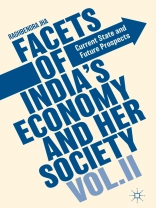‘Jha is the right scholar and economist to take readers through the development of the Indian economy. Readers will be in good hands.’
— Edmund Phelps , Columbia University, USA, and winner of the 2006 Nobel Prize in Economics
‘This is perhaps the best and most scholarly contribution to understanding the Indian Economy and Society. Its rich historical perspective and a profound understanding of how India has evolved into a major economic power set standards of scholarship and analytical rigour that will be hard to surpass’.
— Raghav Gaiha , University of Manchester, UK
‘Linking of economy and society is increasingly recognised as essential for addressing policy challenges by the current phase of globalisation. As such this study should be valuable not just for those studying India, but also for those interested in global developments.’
— Mukul Asher , National University of Singapore, Singapore
‘This book is a tour-de-force reviewof the fundamental topics on the Indian political economy and society that are relevant for any committed social scientist to be aware of.’
— Sumit K. Majumdar , University of Texas at Dallas, USA
‘Over the years, I have benefited from reading the works of Professor Jha, and from teaching from them. I enthusiastically recommend these two volumes.’
— Raaj Kumar Sah , University of Chicago, USA
This two-volume work provides an account of how India has been meeting its myriad of economic, political and social challenges and how things are expected to evolve in the future. Despite enormous challenges at the time of independence, India chose to address them within a secular, liberal, democratic framework, which guaranteed several fundamental rights. Challenges included intense mass poverty and hunger, very poor literacy and educational abilities of the population, the task of uniting a country with scores of languages and ethnicities ruled by different entities for decades and persistent threats of external aggression, to name just a few. Over time, incomes and opportunities have expanded enormously and India has regained her self-confidence as a nation.
In this second volume, Jha examines the performance and prospects for India’s agriculture, manufacturing and services sectors. In addition, India’s links with the external world through international trade, investment, migration and remittances are discussed, as well as gender issues, inter-community relations and India’s future prospects.
Table des matières
Part I: Principal Sectors of the Indian Economy.- Chapter 1: Introduction and the State of Indian Agriculture.- Chapter 2: Trends and Prospects for India’s Manufacturing Sector.- Chapter 3: India’s Service Sector.- Part II: Emerging Issues in India’s Economy.- Chapter 4: India’s Recent Engagement with the Global Economy: Trade, Investment, Remittances and the Diaspora.- Chapter 5: Regional Inequality and Indirect Tax reform in India.- Chapter 6: Education and Health Services in India: A Brief Overview.- Chapter 7: An Overview of the State of the Environment in India.- Part III: Some Aspects of India’s Society and Prospects for the Future.- Chapter 8: Women’s Issues in India.- Chapter 9: Inter-community relations in India.- Chapter 10: Looking Ahead: Prospects for India.
A propos de l’auteur
Raghbendra Jha is Professor of Economics at the Australian National University. He has previously taught at Columbia University and Williams College, USA; Queen’s University, Canada; University of Warwick, UK; and Delhi School of Economics, IIM Bangalore and IGIDR (Mumbai) in India. He has published extensively in the areas of macroeconomics, public economics and social welfare, with a country focus on India.












